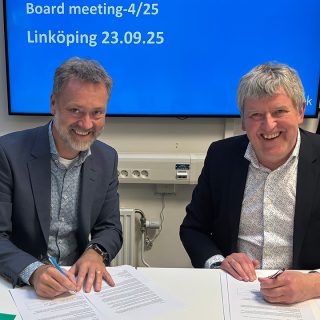The conference featured international speakers addressing AI’s challenges and opportunities across various sectors. The programme highlighted insights on research, education and industrial applications. As the integration of AI with university research, teaching, and beyond becomes increasingly crucial, this forum offered a great opportunity for university leaders, decision-makers, researchers, educators and students from the Nordic and Baltic countries to exchange insights and experiences. In the conference, 130 participants attended the discussions during two days on 12-13th of June.
Technological landscape of AI and its impact on the field of engineering and industrial applications were featured in two company presentations. Digital Product Manager Teijo Hiito from Wärtsilä shared his insights on combining artificial intelligence with human expertise. Digitalisation and innovation lead Jussi Puura from Sandvik featured the role of artificial intelligence in the current and future mining and rock solutions of the company. These interesting industrial presentations gave the university leaders, professors and teachers valuable insights on the development of the changing skills and working life demands, which universities should be able to equip their graduates. Also, in terms of national and global climate goals, both universities, policymakers and business leaders should be looking for innovative technologies, such as artificial intelligence, to help in addressing the sustainability goals and to foster the product and business development to solve these challenges.
In his presentation featuring disruptive technologies and future visions, Puura illustrated the changing engineering skill demands by highlighting the technical landscape in mining industry. From the perspective of skill demands, the graduating engineers need to master skills that combine both engineering and business understanding and to have knowledge and competencies where the artificial intelligence technologies meet robotics, digitalisation and internet of things infrastructure.
Adoption of artificial intelligence tools by industries is rapidly changing how workers perform their jobs, how work is organised and what kind of skills are demanded. Many industries and companies in different fields demand more and more workers with AI skills, i.e. workers with the knowledge and competencies to actively develop and maintain AI models, tools and applications.
According to a recent OECD survey (Green, A. (2024), “Artificial intelligence and the changing demand for skills in the labour market”, OECD Artificial Intelligence Papers, No. 14, OECD Publishing, Paris, https://doi.org/10.1787/88684e36-en), the most demanded skills in occupations with high AI exposure are management, business processes and social skills. Integration of e.g. project management skills, business skills and social competencies needed in customer interface in addition to the technical and engineering side of the artificial intelligence will equip our engineering students and graduates for the future working life demands.





